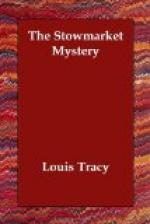“He’s smart, I know he’s smart,” mused the detective. “But he doesn’t know everything about this affair. He doesn’t know, I’ll be bound, that David Hume-Frazer waited for his cousin that night outside the library. I didn’t know it—worse luck!—until after he was acquitted. And he doesn’t know that Miss Nellie Layton didn’t reach home until 1.30 a.m., though she left the ball at 12.15, and her house is, so to speak, a minute’s walk distant. And she was in a carriage. Oh, there’s more in this case than meets the eye! I can’t say which would please me most, to find out the real murderer, if Hume didn’t do it, or prove Mr. Brett to be in the wrong!”
CHAPTER VII
HUSBAND AND WIFE
Brett did not hurry on his way to the Hall. Already things were in a whirl, and the confusion was so great that he was momentarily unable to map out a definite line of action.
The relations between Capella and his wife were evidently strained almost to breaking point, and it was this very fact which caused him the greatest perplexity.
They had been married little more than six months. They were an extraordinarily handsome couple, apparently well suited to each other by temperament and mutual sympathies, whilst their means were ample enough to permit them to live under any conditions they might choose, and gratify personal hobbies to the fullest extent.
What, then, could have happened to divide them so completely?
Surely not Capella’s new-born passion for Helen Layton. Not even a hot-blooded Southerner could be guilty of such deliberate rascality, such ineffable folly, during the first few months after his marriage to a beautiful and wealthy wife.
No, this hypothesis must be rejected. Margaret Capella had drifted apart from her husband almost as soon as they reached England on their return as man and wife. Capella, miserable and disillusioned, buried alive in a country place—for such must existence in Beechcroft mean to a man of his inclinations—had discovered a startling contrast between his passionate and moody spouse, and the bright, pleasant-mannered girl whose ill-fortune it was to create discord between the inmates of the Hall.
This theory did not wholly exonerate the Italian, but it explained a good deal. The barrister saw no cause as yet to suspect Capella of the young baronet’s murder. Were he guilty of that ghastly crime, his motive must have been to secure for himself the position he was now deliberately imperilling—all for a girl’s pretty face.
The explanation would not suffice. Brett had seen much that is hidden from public ken in the vagaries of criminals, but he had never yet met a man wholly bad, and at the same time in full possession of his senses.
To adopt the hasty judgment arrived at by Hume and Mrs. Eastham, Capella must be deemed capable of murdering his wife’s brother, of bringing about the death of his wife after securing the reversion of her vast property to himself, and of falling in love with Helen—all in the same breath. This species of criminality was only met with in lunatics, and Capella impressed the barrister as an emotional personage, capable of supreme good as of supreme evil, but quite sane.




